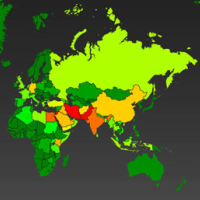U.S. Spies Collect 3 Billion Pieces of Intelligence a Day from Computer and Telephone Networks Worldwide
 Boundless Informant heat map (graphic: The Guardian)
Boundless Informant heat map (graphic: The Guardian)
The U.S. government’s top intelligence gathering agency vacuums up an enormous amount of data each day from computers in the United States and around the globe, according to the British newspaper The Guardian.
Using a top-secret data-mining tool known as Boundless Informant, the National Security Agency (NSA) was able to collect 97 billion pieces of intel from computer networks worldwide during March. That’s an average of three billion pieces a day.
About 100 million were pulled from U.S. computers on a daily basis. But the NSA is apparently mostly interested in data from certain foreign countries.
Half of the pieces of intelligence came from just five countries. More than 14 billion reports originated from Iran, 13.5 billion from Pakistan, 12.7 billion from Jordan, 7.6 billion from Egypt and 6.3 billion from India, home to numerous corporate call centers.
Presumably, the information gathered includes phone calls, emails, text messages, social network posts, credit card purchases and bank transactions, among other items of interest. Whether the Bush and Obama administrations have shared this information with “friendly” dictators is not known…yet.
The revelations about this information gathering have been particularly embarrassing for James Clapper, the Director of National Intelligence, because on March 12, at a Senate hearing, Sen. Ron Wyden (D-Oregon) asked Clapper if the NSA was collecting “any type of data at all on millions or hundreds of millions of Americans.” Clapper answered, “No sir. Not wittingly,” a response that has now been exposed as a blatant lie.
- David Wallechinsky, Noel Brinkerhoff
To Learn More:
Boundless Informant: the NSA's Secret Tool to Track Global Surveillance Data (by Glenn Greenwald and Ewen MacAskill, The Guardian)
Boundless Informant: US Gov’t Collects 100 Billion Surveillance Records a Month (by Charlie Osborne, ZDNet)
Secret Surveillance and the Crisis of Legitimacy (by Steven Aftergood, Secrecy News)
How the U.S. Uses Technology to Mine More Data More Quickly (by James Risen and Eric Lichtblau, New York Times)
BoundlessInformant—Frequently Asked Questions (pdf)
BoundlessInformant—Describing Mission Capabilities from Metadata Records (pdf)
- Top Stories
- Unusual News
- Where is the Money Going?
- Controversies
- U.S. and the World
- Appointments and Resignations
- Latest News
- Musk and Trump Fire Members of Congress
- Trump Calls for Violent Street Demonstrations Against Himself
- Trump Changes Name of Republican Party
- The 2024 Election By the Numbers
- Bashar al-Assad—The Fall of a Rabid AntiSemite






Comments